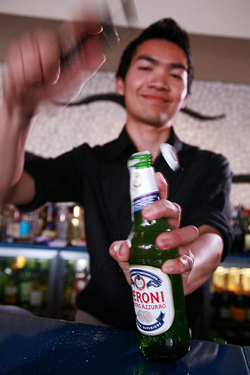It’s all about money
In a recent interview with the English newspaper The Telegraph, SABMiller’s CEO Graham Mackay was his usual bullish self and called a spade a spade and a beer a beer.
Other brewers talk about brands, about beer, about the lore of brewing – not so Mr Mackay. Having been with SAB for three decades now, he has seen so many economic cycles that he is probably your best choice when it comes to talking about what really matters: money.
SABMiller is unusual for a UK listed consumer goods company in that the size of its UK business is small compared with its operations elsewhere. Mr Mackay reportedly said: "We don’t have a major domestic business which ties us to the UK. Our choice of locating ourselves, our headquarters and our tax base here was based on the City and on London’s attraction as a financial centre. That pull is not as strong as it was."
He admitted that SAB’s board had discussed moving away from Britain "from time to time" but said this was not under "active consideration".
The board has also considered a New York listing in recent years - Mackay believes US investors have a better understanding of the company than their UK counterparts - which persuaded the company to go through an internal programme to make itself Sarbanes-Oxley compliant.
Mackay said that this was "extremely fortunate" in retrospect, given SAB’s decision to create a joint venture with Molson Coors in the U.S. Regulatory approval for the enterprise should come in the next few weeks, and SAB’s chief is confident the deal will finally dispel any lingering doubts over the brewer’s acquisition of Miller in 2002. "We took on a business that was in terminal decline," he said, underlining that SAB succeeded in changing Miller’s fortunes before domestic giant Anheuser-Busch instigated a cost- cutting programme that "stopped us in our tracks" and took USD 1 billion a year out of beer industry profits in the US.
Miller appears to be back on track, with revenues up 5 percent over the past 12 months, but Mackay insisted there is more to come. "It is still not performing to the levels it needs to in order to make an adequate return on capital but we believe the joint venture with Coors will put it in a position to do all that and more.”
He admits a move into the spirits market could be a possibility, but says that while SAB has studied spirits brands in some local markets, no decision has been made.
In mid May SABMiller reported that full-year EBITA rose 15 percent while its lager volumes grew 11 percent to 239 million hl. The world’s number two brewer reported an EBITA of USD 4.1 billion for the year ending 31 March, compared with USD 3.6 billion in the previous year.
Revenue was up 15 percent to USD 21.4 billion.
The group’s associate in China, CR Snow, acquired four breweries in the past year and grew volumes by 15 percent, with the acquisition of Dutch brewer Royal Grolsch in February contributing to volume gains.
SABMiller preliminary results for the full year ended 31 March 2008
| 2008 EBITA USD m | Reported growth % | Organic, constant currency growth % | |
| Latin America | 1,071 | 17 | 6 |
| Europe | 952 | 30 | 15 |
| North America | 477 | 27 | 27 |
| Africa and Asia | 568 | 22 | 16 |
| South Africa: Beverages | 1,026 | (7) | (6) |
| South Africa: Hotels and Gaming | 141 | 41 | 42 |
| Corporate | (94) | n/a | n/a |
| Group | 4,141 | 15 | 9 |
SABMiller also announced it had agreed with Anheuser-Busch to transfer the US importation rights for the Grolsch brand to its subsidiary, Miller Brewing Company. The transfer is subject to the negotiation of definitive legal agreements, which would be finalised in the next few weeks, the company said.
Anheuser-Busch acquired the US distribution rights to the Grolsch brand in February 2006, prior to SABMiller’s acquisition of Royal Grolsch, which was completed in February 2008 and must have left Anheuser-Busch gobsmacked. Why did they not buy Grolsch themselves? Or rather why did Grolsch have to go to their rival SABMiller?
In 2007, Grolsch imports into the US grew to approximately 215,000 hl, it was reported. Imported beers have grown at nearly 10 percent per annum for the last three years and now make up 15 percent of the US beer market.
The agreement will give Grolsch access to Miller’s network of about 450 distributors.
| Tiger Relaunched in 2005 Peroni Nastro Azzurro is the UK’s fastest growing premium lager brand with sales up by |



